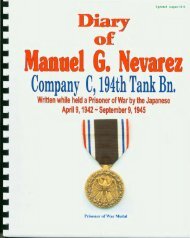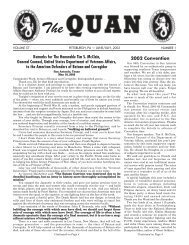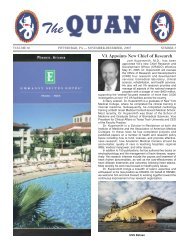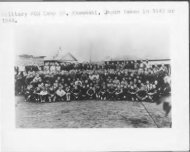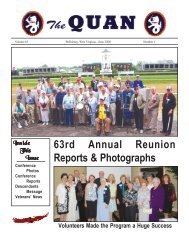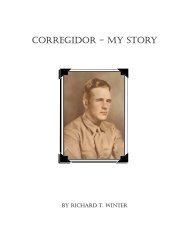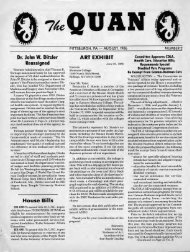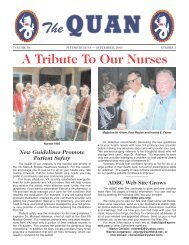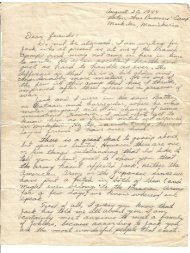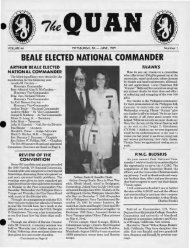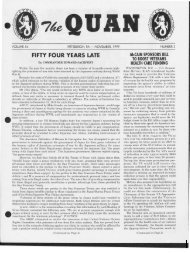Jan. 2001 - Philippine Defenders Main
Jan. 2001 - Philippine Defenders Main
Jan. 2001 - Philippine Defenders Main
Create successful ePaper yourself
Turn your PDF publications into a flip-book with our unique Google optimized e-Paper software.
EX-POWS TO APPEAL FOR<br />
WAR REPARATIONS<br />
6 — THE QUAN<br />
By CHRISTINE MAHR<br />
The Desert Sun<br />
Former prisoners of war seeking retribution<br />
from Japanese companies for alleged<br />
slave labor haven’t lost their battle yet.<br />
On one front, their attorneys have filed a<br />
notice of intent to appeal the September ruling<br />
by U.S. District Court Judge Vaughn<br />
Walker, who dismissed their suits.<br />
On another, the former POWs have<br />
received the support of the U.S. Senate, which<br />
this week unanimously adopted a resolution<br />
urging the federal government to help bring<br />
about talks between the veterans and private<br />
Japanese companies that allegedly profited<br />
from their labor during World War II.<br />
The resolution was introduced by Sens.<br />
Dianne Feinstein, D-California, and Orrin<br />
Hatch, R-Utah.<br />
“This is significant; you have a Republi can<br />
and a Democrat coming together and saying<br />
it’s the right thing to do,” said James<br />
Parkinson, a Palm Desert attorney.<br />
Parkinson is working with Herman,<br />
Middleton, Casey and Kitchens, the San<br />
Diego law firm that filed many of the suits<br />
on behalf of people who allege Japanese<br />
companies forced them to work in mines and<br />
factories during World War II.<br />
Parkinson represents several former<br />
POWs including Indio resident Alfred<br />
Berest.<br />
Berest still questions whether the ex-prisoners<br />
will ever get the justice they’re seeking,<br />
but he was pleased by the Senate’s<br />
action on their behalf.<br />
“I was surprised and elated,” he said.<br />
The Senate’s resolution runs counter to<br />
the position of the federal government, which<br />
had urged Walker to dismiss the POW suits.<br />
Parkinson said the Senate resolution<br />
won’t have any impact on the court case.<br />
But, he said, it could lead to efforts by the<br />
government to intervene on behalf of the<br />
POWs as it did in recent claims raised by<br />
Holocaust survivors against German corporations<br />
that used slave labor.<br />
The government took no position in the<br />
Holocaust litigation but did help initiate<br />
talks between the German companies and<br />
the victims.<br />
“This (Senate resolution) says to the government,<br />
‘Why don’t you do the right thing<br />
and bring the parties together, like you did<br />
with the Holocaust victims?’ ” Parkinson<br />
said.<br />
In its statement in the federal court case<br />
dismissed by Walker, the U.S. Justice<br />
Department said the POWs’ claims are barred<br />
by the 1951 peace treaty with Japan.<br />
Attorneys for the Japanese corporations<br />
that were sued said the 1951 treaty basically<br />
settled any disputes with Japan.<br />
Christine Mahr covers courts for The<br />
Desert Sun. She can be reached at 775-4207<br />
or at<br />
Christine.Mahr@thedesertsun.com.<br />
JAPANESE WWII SOLDIER<br />
DETAILS GERM PRODUCTION<br />
IN TOKYO COURT TESTIMONY<br />
THE ASSOCIATED PRESS<br />
TOKYO — In the first testimony of its<br />
kind, a former Japanese soldier has told a<br />
Tokyo court that he helped produce deadly<br />
germs and participated in biological experiments<br />
in China during World War II.<br />
Yoshio Shinozuka, 77, said he participated<br />
in the mass production of cholera,<br />
dysentery and typhoid germs. He said he<br />
also assisted in the vivisection of Chinese<br />
civilians in the early 1940s.<br />
“What I have done was something that<br />
nobody should have done as a human<br />
being. I cannot escape that responsibility,”<br />
he said recently.<br />
Though Shinozuka has spoken out<br />
publicly about his role, his testimony<br />
makes him the first member of the notorious<br />
Unit 731 to acknowledge before a<br />
court its role in Japan’s biological warfare<br />
in northern China. He was called as a witness<br />
for nearly 180 Chinese suing the<br />
Japanese government for compensation<br />
and an apology for the deaths of family<br />
members allegedly killed by the unit’s<br />
activities.<br />
The trial at the Tokyo District Court is<br />
expected to continue for several more<br />
months.<br />
Shinozuka said he was often told to help<br />
out departments that needed to boost<br />
germ production for upcoming deployments,<br />
including the 1939 Nomonhan<br />
attack near Mongolia and several other<br />
germ bombing attacks in southern China<br />
in the 1940s.<br />
He said that just before the 1939<br />
Nomonhan attack, he was responsible for<br />
transferring dysentery and typhoid germs<br />
from test tubes to bigger jars, packing<br />
them into barrels, sealing them and taking<br />
them to a night train for the attack.<br />
Although some Japanese veterans have<br />
confessed to war crimes in recent years,<br />
the Japanese government has shied away<br />
from making apologies to China. Japanese<br />
textbooks still often present only brief,<br />
perfunctory accounts of Japan’s aggression<br />
in East Asia from the mid-1930s to<br />
the war’s end in 1945.<br />
shinozuka said one of his reasons for<br />
testifying was disappointment with the<br />
government’s efforts to come clean about<br />
the war.<br />
“I committed all these war crimes<br />
because I was ordered to do so,” he said.<br />
“The government should try to learn about<br />
the victims. I really think it’s time for<br />
Japan to face this issue with humanitarian<br />
consideration.”<br />
BRITAIN TO PAY FORMER<br />
PRISONERS OF JAPANESE<br />
LONDON, Nov. 7 (AP) — Thousands of<br />
British servicemen held prisoner by the<br />
Japanese during World War II will receive<br />
payments of $15,000 each, the government<br />
announced today, decades after the soldiers<br />
first began seeking compensation for<br />
their suffering.<br />
The payment plan, announced by<br />
Defense Minister Lewis Moonie, will cover<br />
up to 16,700 former prisoners including<br />
camp survivors and their widows.<br />
Successive British governments had<br />
resisted paying the former POWs compensation,<br />
not wanting to open the door to<br />
other such claims. But Mr. Moonie said<br />
the “unique circumstances of their cap -<br />
tivity” warranted an exception.<br />
Noting that more than 12,400 of the<br />
50,016 British service personnel reported<br />
captured by the Japanese died in cap -<br />
tivity, Mr. Moonie said the prisoners’<br />
experiences were “often so appalling that<br />
… it has remained with them for the rest<br />
of their lives.”<br />
During the war, Japan made slave<br />
laborers of Allied POWs in Asia, forcing<br />
them to work under brutal conditions in<br />
jungles, mines and shipyards. Beating,<br />
starvation and executions were common.<br />
The POW death rate in Japanese camps<br />
was 27 percent, compared to a 4 percent<br />
rate in Allied camps.<br />
Efforts to win compensation from Japan<br />
through its court system were unsuccessful.<br />
In 1998, a Tokyo court rejected their<br />
demands, saying compensation issues<br />
were settled by postwar treaties.<br />
—————————<br />
SENATE:<br />
SETTLE POW LAWSUITS<br />
The Senate is urging the Clinton administration<br />
to help negotiate a settlement to<br />
lawsuits brought by American World War<br />
II POWs who contend Japanese com -<br />
panies mistreated them as slave laborers.<br />
Administration officials say the former<br />
prisoners’ lawsuits against the private<br />
companies are prohibited under a 1951<br />
peace treaty between the United States<br />
and Japan.<br />
But the Senate voted unanimously late<br />
Tuesday to urge the State Department to<br />
open a dialogue between veterans and the<br />
companies because prisoners were forced<br />
to work for years while being beaten,<br />
starved and denied medical care.<br />
The recommendation came in a nonbinding<br />
resolution that doesn’t require<br />
President Clinton’s signature. The vote<br />
sent it to the House for consideration.<br />
Neither the Japanese Embassy nor the<br />
White House returned calls seeking<br />
comment. But administration officials<br />
have opposed similar legislation in the<br />
past.



